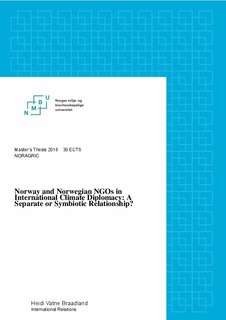| dc.description.abstract | Climate change and its consequences is a major challenge facing the world today, and it needs the world to come together to solve it, or to slow it down. This is the reason for the establishment of the United Nation’s Framework Convention on Climate Change, which allows states to come together and discuss efforts against climate change with the goal of creating a strong international agreement on climate change. Non-state actors, such as NGOs, can be a huge contribution to this.
This thesis strives to place non-state actors within diplomatic theory, and explain the contributions they come with in diplomatic processes. In order to do this it looks at the climate negotiations within UNFCCC. This thesis narrows down to the roles and actions of the Norwegian government and official delegation, and that of the Norwegian NGOs. It also looks at the relationship between them, and how this as affected their impact at the negotiations.
The main theoretical framework is based on the writings of John Robert Kelley, who claims that official and non-official diplomats work separately within the same sphere, but that the states that have a close relationship with the NGOs, and actively interacts and use them, are those that will have most success in the future. James Der Derian’s six paradigms are also used to show the complexity of the diplomatic evolution, and show tension points between the traditional and non-traditional actors in diplomacy. They also introduce the paradigm that this thesis is in, that of techno-diplomacy.
My findings suggest that Norway and the Norwegian NGOs do not work separately, but they work closely together, both prior and during the COPs. Their relationship is formal in the way that the formal delegation from Norway has two representatives from the NGOs. This relationship is mutually beneficial. The Norwegian NGOs gain access to closed negotiation rooms, and thus gets knowledge and information they can share with other NGOs. They also have a direct link to the top negotiators in Norway, which is beneficial when they want to influence the Norwegian positions and strategies. For the “official” Norway, this relationship gives them new perspectives and ideas they may not have thought of, and they get access to the international networks the NGOs have. They may also help in negotiations, by providing information gained through informal channels the Norwegian delegation is not privy to. It also helps Norway with its good international reputation, which again helps Norway in the negotiating process. | nb_NO |

